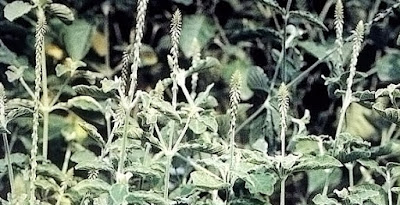Achyranthes Aspera,
Devil's Horsewhip, Latjira, Apamarga
Achyranthes
Aspera (commonly known as: chaff-flower, prickly chaff flower, devil's
horsewhip) is used for a great many medicinal purposes, especially in
obstetrics and gynecology, including abortion, induction of labor, and
cessation of postpartum bleeding. The Maasai people of Kenya use the plant
medicinally to ease the symptoms of malaria. Achyranthes Aspera has occupied a
pivotal position in Indian culture and folk medicine. Since ancient times the
tribal and rural people of India commonly use this herb in various disorders.
Achyranthes aspera is known for its mood enhancing effects and is used to treat
depression and forms of anxiety.
English
Names: Prickly Chaff Flower.
Ayurvedic
Names: Apaamaarga, Chirchitaa,
Apamarga
Other
Common Names: Aaghaat, Adahshalya,
Chichidaa, Kanihi, Kharamanjari, Kharapushpaa,
Latjeeraa, Mayura, Mayuraka, Naayuruvi, Pratyakpushpaa, Shaikharika, Shikhari,
Vashira.
Medicinal
Properties of Apaamaarga (Achyranthes Aspera):
Astringent,
pectoral (ashes of the plant used in asthma and cough), diuretic,
hepatoprotective, emmenagogue. Benzene extract of the plant exhibited
abortifacient activity. The flowers, ground and mixed with sugar, are given for
menorrhagia.
Roots
- astringent, haemostatic.
Seeds
- emetic; used for biliousness.
Essential
oil - antifungal.
Medicinal Benefits
of Latjira (Achyranthes Aspera):
The
Ayurveda indicates the use of the whole plant in lipid disorders and obesity,
the root for its blood-purifying property.
The plant juice and ash
are used for treating bleeding piles. An alkaline powder of the plant is used
in preparing Kshaarasutra of Ayurvedic medicine, which is recommended for
treating fistula-in-ano.
The
whole plant contains the alkaloids achyranthine and betaine. Achyranthine, a
water-soluble alkaloid, is reported to dilate blood vessels, lower blood
pressure, decrease heart rate and increase the rate and amplitude of
respiration. It also shows spasmodic effects on the rectus muscle of frog,
diuretic and purgative action in albino rats.
The presence of
ecdysterone and oleanolic acid is also reported in the root.
The
ashes of the plant yield large quantities of potash. The seeds yield saponins
and oleanolic acid and its ester. The presence of tannins and glycosides is
also reported in the plant.
TRADITIONAL
USES OF ACHYRANTHES ASPERA – LATJIRA – APAMAARGA:
To
induce abortion a thin paste is applied to external genitalia or a small
quantity of decoction obtained by boiling fresh root in water is introduced in
vagina.
To
induce labor pains a thin paste of fresh roots is applied to external
genitalia.
Fresh root
extract/decoction is given orally:
1.
To expel dead
fetus the juice of fresh roots is given orally.
2.
Post- partal body
aches
3.
Post-abortion
abdominal pain
4.
Costodynia (pain
in ribs)
5.
Post-delivery/abortion
jaundice
6.
To expel the
remains of placenta after abortion
Decoction of chopped
fresh leaves is given orally in:
1.
Excessive
hemorrhage during pregnancy
2.
Excessive
hemorrhage during early pregnancy
3.
Post-partal
hemorrhage
4.
Post- partal
fever – with decoctions of neem (Azadirachta indica)
5.
Post-partal loss
of appetite (Anorexia) – with kala namak (sodium chloride mixed with sodium
sulphate)
6.
Prolonged
menstrual flow – (mixed with curd)
7.
Amenorrhoea –
(with empty stomach before sunrise)
8.
Dysmenorrhoea
9.
Menoxenia
(abnormal or irregular menses/menstrual cycles) – (fresh leaf decoctions of
Punarnava (Boerhavia diffusa) can be added for better results.
10.
Leucorrhoea -
Fresh leaf extract mixed with a little curd is given orally before sunrise
11.
Habitual abortion
– with powder of Ashwagandha roots (Withania somnifera)
12.
Abnormal
secretion of lochia
Decoction
of root and stem is administered orally to cure Infertility in women.



No comments:
Post a Comment